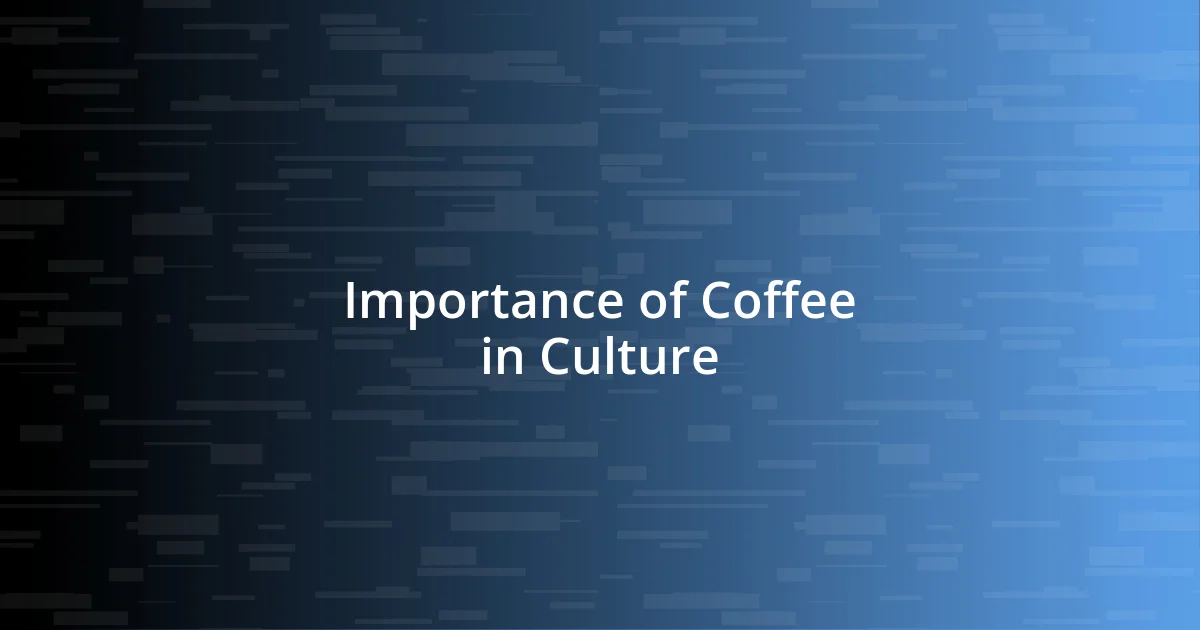Key takeaways:
- Ethiopian coffee rituals are a profound cultural experience that emphasizes community, connection, and storytelling while preparing and sharing coffee.
- The coffee ceremony includes significant stages such as roasting, grinding, and serving, each designed to foster mindfulness and bond participants through a shared experience.
- Essential tools like the jebena (coffee pot) and mukecha (mortar and pestle) highlight the artistry of traditional coffee-making, enriching both the ritual and the communal atmosphere.

Introduction to Ethiopian Coffee Rituals
Ethiopian coffee rituals are steeped in tradition and community, transforming a simple brew into a profound cultural experience. I still vividly recall the first time I witnessed a coffee ceremony; the air was thick with the aroma of roasting beans, and I felt an excitement that was palpable. It made me ponder, how many moments do we let slip by without appreciating their true essence?
At the heart of these rituals is the meticulous process of preparing coffee, where every step reflects both artistry and care. As I watched the host skillfully roast the green beans over an open flame, I experienced a blend of anticipation and reverence. It made me think: is there any better way to connect with others than through the shared experience of crafting something together?
The ceremony is more than just a drink; it’s a moment of storytelling and bonding. I remember how the gentle clinking of the traditional coffee pot, known as a jebena, resonated like a sweet melody. It drew everyone into a rhythm of laughter and conversation, prompting me to consider how coffee can bridge gaps and create connection.

History of Ethiopian Coffee
The history of Ethiopian coffee is fascinating, steeped in legend and tradition. It is said to have originated in the ancient coffee forests of Ethiopia, where a goat herder named Kaldi first discovered the energizing effects of coffee beans after noticing how lively his goats became after consuming them. This serendipitous moment sparked a journey that would eventually lead to the coffee we know today.
- Etymology: Coffee is thought to be derived from the Arabic word “qahwa,” meaning strength.
- Cultural Significance: In Ethiopian culture, coffee is a symbol of hospitality and community.
- First Coffee Trade: The first known mention of coffee dates back to the 15th century in the region of Ethiopia known as Kaffa, which is often linked to the beverage’s name.
- Spread to the Arab World: By the 16th century, coffee made its way to the Middle East, where it became central to social life.
My journey into understanding Ethiopian coffee took a personal twist when I learned about the ceremonial roles it played in communities. I still remember a local elder sharing stories of how coffee brought families together during times of hardship, weaving a tapestry of strength and resilience. It made me think about the profound impact of these rituals—how something as simple as coffee could carry the weight of collective histories and personal experiences. The next time I sip a coffee, I don’t just taste the rich flavors; I feel the stories of generations that brew along with it.

Importance of Coffee in Culture
Coffee is not just a beverage; in Ethiopian culture, it holds a sacred place that transcends daily routine. I recall attending a friend’s family coffee ceremony and being completely engrossed in the stories shared alongside each sip. As the coffee flowed, tales of ancestors and community triumphs unfolded, showcasing how coffee serves as a catalyst for connection—uniting people not just through flavor but through shared narratives.
The coffee ritual embodies values like respect and hospitality, making it integral to social gatherings. It’s fascinating to consider how the coffee pot—an unassuming object—can transform a home into a haven of warmth and dialogue. Watching my friend’s family gather around the jebena, I was reminded of my own upbringing and how simple gatherings often shape our understanding of community.
Moreover, the preparation process itself emphasizes patience and mindfulness. I found it intriguing when I learned how the host will often engage the guests in conversation while skillfully roasting the beans. This act of brewing coffee becomes a performance of sorts, inviting everyone to participate and reflect. In those moments, I realized that we often overlook how such rituals can remind us to slow down and appreciate the present—something we all could use a bit more of in our fast-paced lives.
| Cultural Aspect | Description |
|---|---|
| Symbol of Hospitality | Coffee is a gesture of welcome, representing the host’s respect and care for guests. |
| Community Connection | Rituals around coffee foster storytelling and bonding among participants. |
| Mindfulness | Brewing coffee is an artful process that encourages reflection and appreciation of the moment. |

Stages of the Coffee Ceremony
The Ethiopian coffee ceremony consists of several distinct stages, each infused with significance. First, the host cleans the green coffee beans and lays them out for roasting, an act imbued with care and respect. I distinctly remember watching a woman at a ceremony in a small village, her smile capturing the essence of this moment as she skillfully roasted the beans over an open flame—how did something so simple evoke such warmth?
Once roasted, the beans are ground by hand, and it’s here that the aroma starts to permeate the air. I recall feeling a rush of anticipation as the fragrance enveloped me, igniting my senses just like the vibrant conversations that often accompany this stage. It made me ponder how a scent could evoke such a sense of belonging, connecting us not only to the coffee but to each other.
Finally, the brewed coffee is served in small cups, accompanied by sweet accompaniments like sugar and popcorn. I always find it fascinating how this part of the ceremony encourages camaraderie. Everyone gathers to sip and share stories, creating a collective experience that highlights the power of community. Isn’t it beautiful how something as ordinary as coffee can transform into a powerful symbol of connection and shared history?

Essential Tools for Coffee Making
When it comes to the essential tools for making Ethiopian coffee, the jebena is undoubtedly at the heart of the ritual. This traditional pot, often crafted from clay, not only serves a practical purpose but also holds deep cultural significance. I remember the first time I saw a jebena—its unique, curvy shape and the way it was meticulously handled added an artistic touch to the whole coffee-making experience. Have you ever thought about how the vessel we use to brew can shape our perception of the drink?
Another key tool is the mortar and pestle, known as a “mukecha” for grinding the roasted beans. It’s a simple yet effective piece of equipment that turns the roasted beans into a fragrant, coarse grind. I recall how my fingers felt on the rough surface of the pestle, connecting me to a tradition that has been passed down through generations. Grinding the coffee can feel almost meditative, as you engage not just with the ingredients but also with the essence of the ritual itself.
Lastly, let’s not overlook the importance of small cups, or “sini,” used for serving. Each cup makes every sip feel special, often accompanied by animated discussion. I often find myself smiling when I hold a cup that has witnessed countless stories and laughter. It’s incredible how such a simple tool can encapsulate the spirit of togetherness and joy that the coffee ceremony embodies. Don’t you think that each tool tells a story of its own, inviting us to participate in something larger?

Tips for Hosting a Coffee Ceremony
Hosting an Ethiopian coffee ceremony requires careful consideration and preparation to truly capture its essence. I remember the first time I attempted this; laying out a colorful woven basket filled with snacks felt like setting the stage for a beautiful storytelling session. It’s important to have sweet treats, like popcorn or sugar, on hand because they enhance the experience. Have you ever noticed how a little sweetness can open up a person’s heart during a gathering?
Creating the right ambiance is crucial. I once dimmed the lights and lit some candles, which made everyone instantly feel more relaxed and connected. This simple change in atmosphere transformed the gathering into a warm, inviting space where stories flowed as freely as the coffee itself. Think about how essential it is to craft an environment that encourages openness and joy, don’t you agree?
Lastly, take your time with each stage of the ceremony. I’ve learned that rushing through the process can dilute its beauty. Each pour and sip deserves attention, as this is where meaningful conversations flourish. Remember, it’s about savoring the moment, much like the coffee—you want to steep every experience in richness. Do you see how each step can elevate not just the drink but the entire gathering?

Tasting and Enjoying Ethiopian Coffee
Tasting Ethiopian coffee is an experience that transcends mere flavor; it’s a moment to connect with culture and history. I recall my first sip, where the rich, earthy notes danced on my palate, accompanied by a hint of floral sweetness. Have you ever felt a sudden rush of warmth from a drink, as if it carried a thousand stories from its origin? Each taste transports me to the lush highlands where the beans are meticulously cultivated.
As I savored every sip, I couldn’t help but notice the shared moments around the table—the laughter, the stories exchanged. It wasn’t just about enjoying coffee; it was about bonding. In that warm atmosphere, I felt a sense of belonging and connection, almost as if the coffee was a bridge linking our stories. How often does a simple beverage create such warmth and intimacy among friends and family?
I find that the enjoyment of Ethiopian coffee comes not only from its complexity but also from the ritual itself. As the incense wafted through the air, I was reminded of how sensory experiences can deepen appreciation. Each cup serves as a reminder to slow down and savor life’s moments. Don’t you think we all could benefit from taking a step back to appreciate the simple pleasures that enrich our lives?














